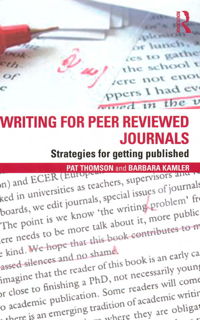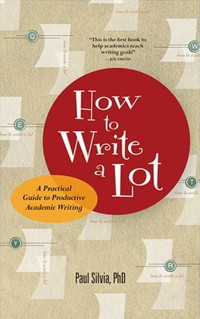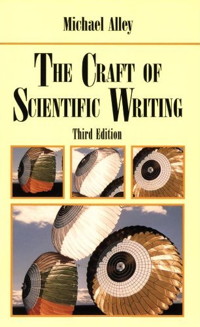“You know how writers are. […] they create themselves as they create their work. Or perhaps they create their work in order to create themselves.”
“Children of the Mind” by Orson Scott Card
Writing, especially scientific writing, is hard work. If you are lucky, you have supervisors or colleagues with whom you can work with to learn about the different levels and skills of writing, ranging from finding out your discourse community and what you have to contribute to the discussion, to organizing your writing and scheduling time, to the nuts and bolts of writing itself.
If not (or to supplement it), here are three books I can highly recommend (updating the posting I wrote about 3 years ago):
1. Determining your audience and your contribution
 Scientific writing does not occur in a vacuum. You have to address a specific community and participate in the discussion of that community — to offer something meaningful to the discussion. A brilliant book in this regard isThomson, P. & Kamler, B. (2013). Writing for Peer Reviewed Journals. Milton Park, Abingdon, Oxon: Routledge.They cover these questions and others, e.g., developing your identity, writing itself, publications plans, engaging with editors/reviewers, or writing with others. Eye-opening regarding the social nature of science and it makes you ask the right questions about your work. I wish this book had been available 5 years ago. Scientific writing does not occur in a vacuum. You have to address a specific community and participate in the discussion of that community — to offer something meaningful to the discussion. A brilliant book in this regard isThomson, P. & Kamler, B. (2013). Writing for Peer Reviewed Journals. Milton Park, Abingdon, Oxon: Routledge.They cover these questions and others, e.g., developing your identity, writing itself, publications plans, engaging with editors/reviewers, or writing with others. Eye-opening regarding the social nature of science and it makes you ask the right questions about your work. I wish this book had been available 5 years ago. |
2. Making and defending time to write
 Still the best book and a must-read for academics who struggle to have time to write:Silvia, P. J. (2007). How to Write a Lot. Washington D.C.: APA.It dispels a lot of myths about writing — like I need “free time”, “a better computer/printer”, etc. Very helpful if it is the organization or motivation of writing that is difficult for you. Still the best book and a must-read for academics who struggle to have time to write:Silvia, P. J. (2007). How to Write a Lot. Washington D.C.: APA.It dispels a lot of myths about writing — like I need “free time”, “a better computer/printer”, etc. Very helpful if it is the organization or motivation of writing that is difficult for you.Image from Amazon.com |
3. The nuts and bolts
 There are a lot of books that deal with the nuts and bolts of writing. Style, grammar, and the like. I still think that this book:Alley, M. (1996). The Craft of Scientific Writing (3rd Edition). New York: Springer.is a very useful and helpful source. Especially the characteristics of good scientific writing (precise, clear, forthright, concise, familiar, and fluid) and the argument that scientific writing is a craft (not dependent on inspiration) are very helpful. There are a lot of books that deal with the nuts and bolts of writing. Style, grammar, and the like. I still think that this book:Alley, M. (1996). The Craft of Scientific Writing (3rd Edition). New York: Springer.is a very useful and helpful source. Especially the characteristics of good scientific writing (precise, clear, forthright, concise, familiar, and fluid) and the argument that scientific writing is a craft (not dependent on inspiration) are very helpful.Image from Amazon.com |
Other sources
BTW, you find other tips for academic work in this literature list or in this presentation. I highly recommend looking at content outlines (and what they allow you to do, e.g., write a thesis in a month) and the difference between content and structural outlines. And of course, the book also contains material on writing and scientific/PhD work.
Update
I think these three books form a triangle of things a scientist should know about writing:

All three sides are needed … without even one of them, it’s hard to impossible to publish. I only wish I had known these books earlier.
I’m finding this one very helpful (I’m an oceanography PhD student):
Schimel, J. (2012). Writing Science: How to write papers that get cited and proposals that get funded. Oxford University Press.
What about: Scientists Must Write: a guide to better writing for scientists, engineers and students by Robert Barrass